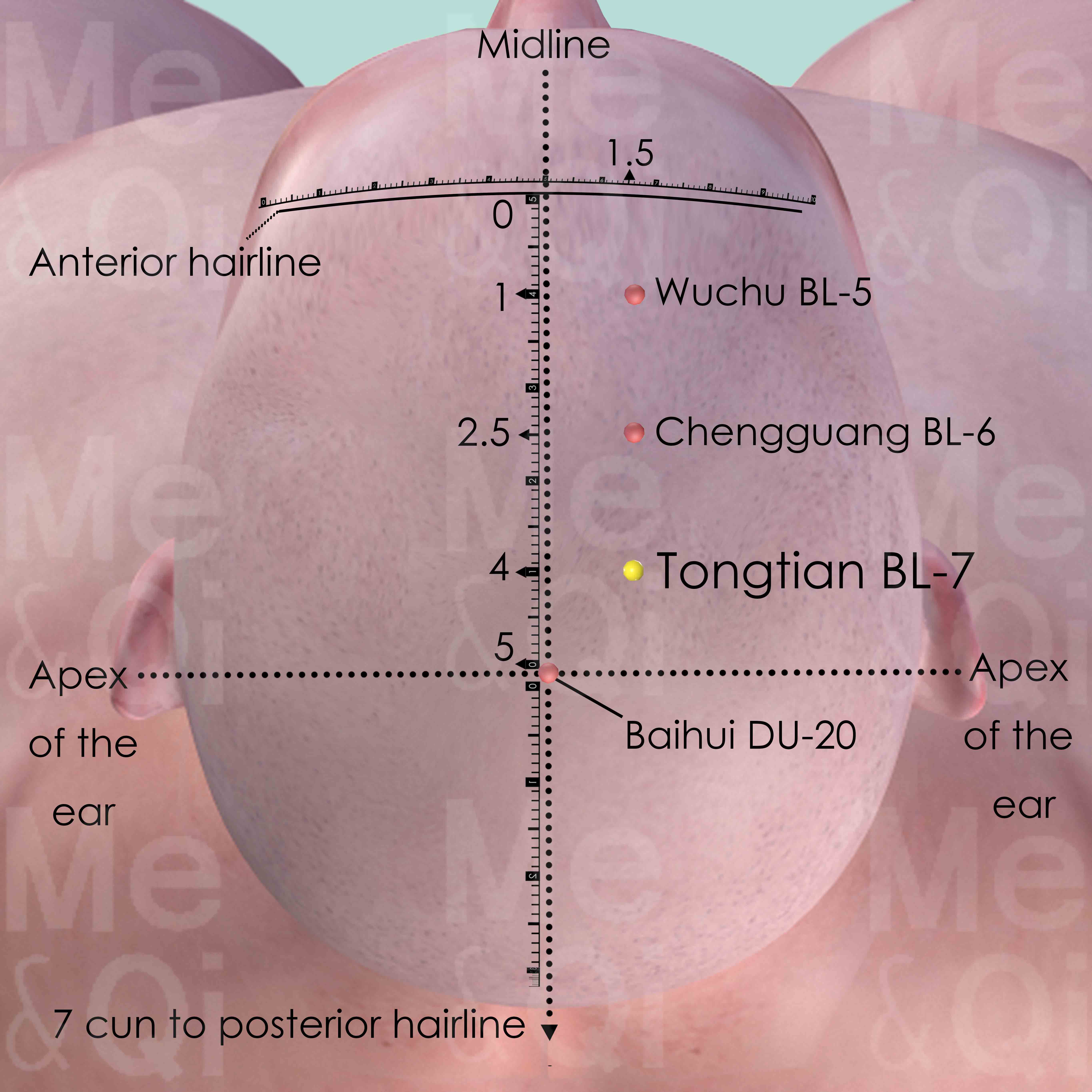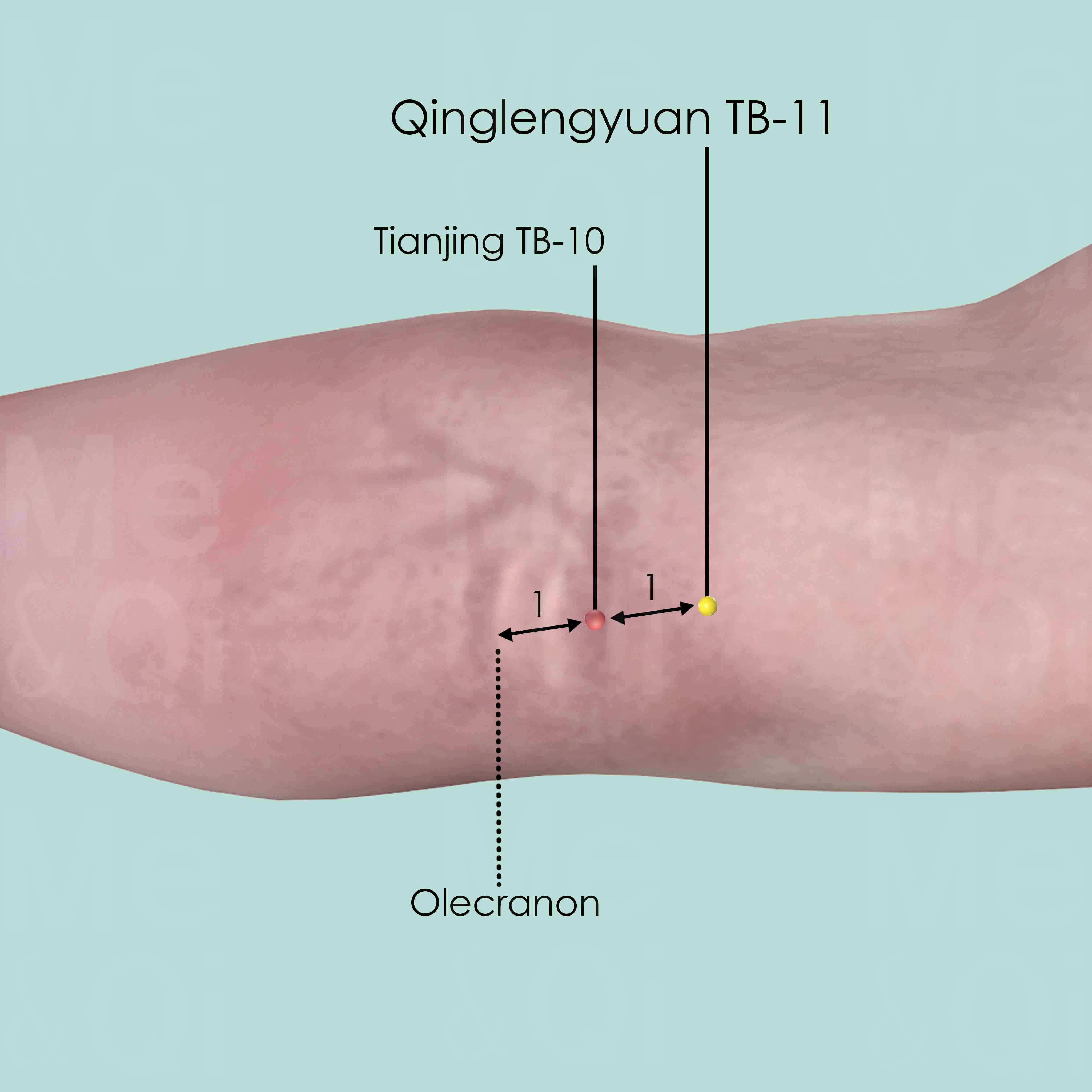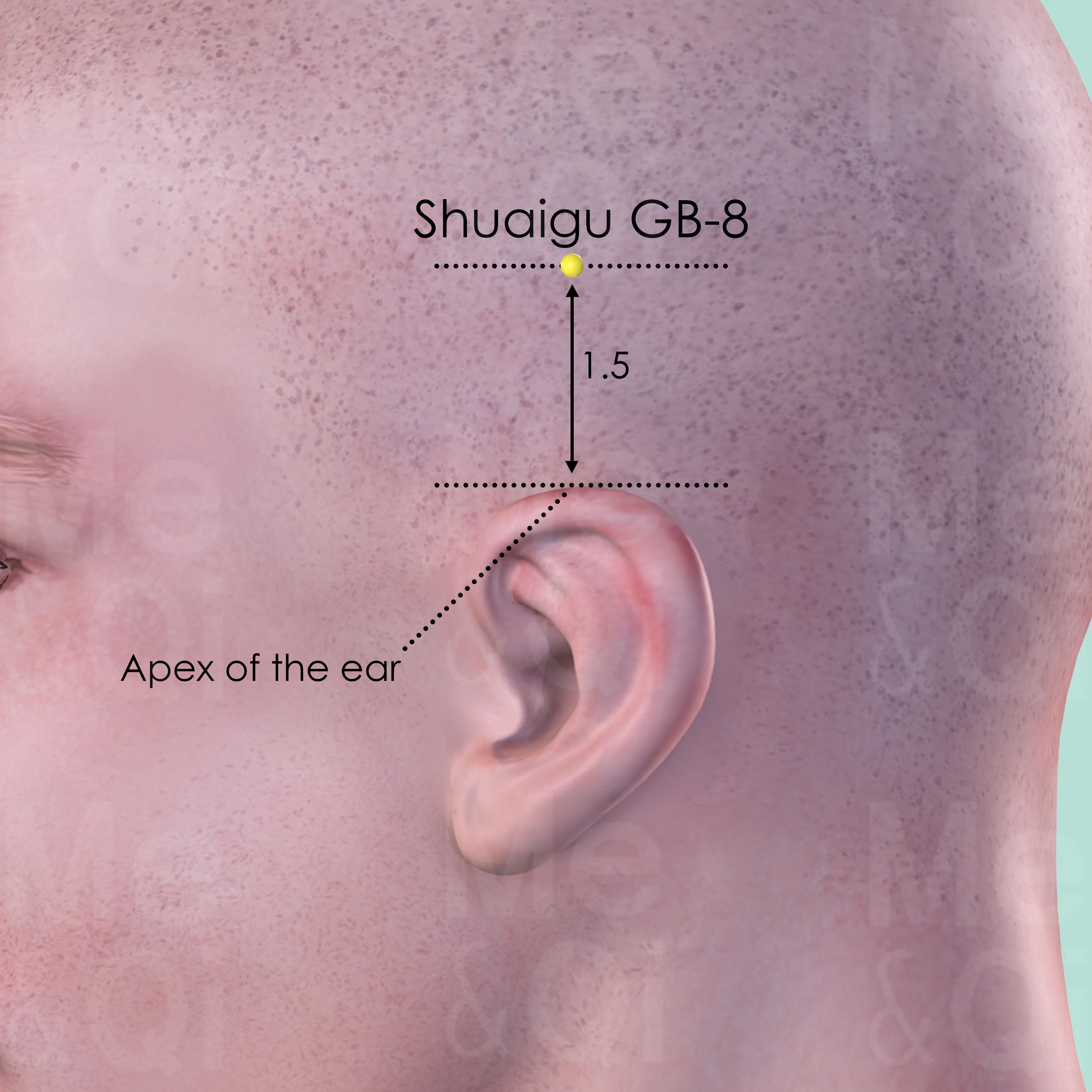Heavy Sensation In The Headaccording to TCM
Symptom family: Head Conditions and Symptoms
What is Heavy Sensation in the Head?
A heavy sensation in the head, often described as a feeling of weightiness or pressure, can be a perplexing and distressing symptom. It's not uncommon for individuals to report a feeling as though they are wearing a helmet too tight for comfort, or as if their head is being pulled down. This sensation can be fleeting or persistent and may be accompanied by other symptoms such as fatigue or difficulty concentrating.
How does TCM view Heavy Sensation in the Head?
Traditional Chinese Medicine (TCM) interprets the heavy sensation in the head as a sign of disharmony within the body's energetic system. Unlike Western medicine, which may attribute this feeling to specific pathological conditions, TCM considers it a symptom of an imbalance in the body’s vital energies, particularly the presence of Dampness or a deficiency in Yang.
Root Causes of Heavy Sensation In The Head in TCM
In the practice of Traditional Chinese Medicine, the heavy sensation in the head is often seen as a manifestation of internal disharmony. The underlying causes, as per TCM, may range from environmental factors contributing to internal Dampness to the body's own Deficiencies or Excesses that disrupt the balance of Qi.
For example, the accumulation of Dampness may lead to a sensation of heaviness, while a Deficiency in the Yang energy of the Spleen or Kidney may manifest similarly, along with symptoms like edema and lethargy. It is the precise pattern of these symptoms and their interactions that guides a TCM practitioner to the root cause of the heaviness.
Explore below more details about what might cause Heavy sensation in the head according to TCM.
Dampness
"Dampness" in TCM is a concept that describes a pattern of disharmony where the body accumulates excess moisture. Imagine the heavy, sticky feeling you get on a very humid day; that's similar to what dampness feels like internally. It can manifest as a sense of heaviness, bloating, sluggishness, or even a foggy mind. This condition is often thought to arise from environmental factors like living in a damp place, dietary habits that promote moisture in the body, or internal imbalances that hinder the body's ability to process fluids properly. In TCM, dampness can obstruct the normal flow of energy and fluids in the body, leading to various symptoms.... see more
Dampness Patterns That Can Lead to Heavy Sensation In The Head
Common Symptoms: Headaches Tight Feeling In Chest And Stomach Diarrhea Fever Neck Gland Swelling Sticky Taste In The Mouth Absence Of Thirst Feeling Hot
| Pattern Name | Relevant Symptoms | Relevant Formulas |
|---|---|---|
| Damp-Heat | Heavy head, Fever, Neck gland swelling, Headaches, Tight feeling in chest and stomach, Sticky taste in the mouth, Absence of thirst, Feeling hot, Feeling of heaviness, Bitter taste in the mouth, Acne... see more | Long Dan Xie Gan Tang | Yi Huang Tang |
| Exterior Cold with Interior Dampness in Summer | Heavy sensation in the head, Chills with warm skin, Lack of sweating, Headaches, Abdominal pain, Vomit, Diarrhea, Tight feeling in chest and stomach, Fatigued extremities, Nausea... see more | Xiang Ru San |
Yang Deficiency
Yang deficiency in TCM refers to a state where the body's Yang energy, which is responsible for warmth, activity, and function, is weakened or diminished. This pattern of disharmony often arises from chronic illness, aging, or inherent constitutional weakness. Symptoms of Yang deficiency are typically associated with cold and sluggishness, such as a feeling of coldness, cold extremities, pale complexion, low energy or fatigue, and a desire for warmth. Digestive issues like poor appetite, loose stools, and water retention can also be indicative of Yang deficiency.... see more
Yang Deficiency Patterns That Can Lead to Heavy Sensation In The Head
| Pattern Name | Relevant Symptoms | Relevant Formulas |
|---|---|---|
| Spleen or Kidney Yang Deficiency | Heavy sensation in the head, Abdominal pain that worsens with cold, Urinary dysfunction, Deep pain and heaviness in limbs, Dizziness, Edema, Diarrhea, Palpitations, Coughing, Vomit, Congestive heart failure... see more | Zhen Wu Tang |
Heat
In TCM "Heat" signifies an excess of Yang energy, leading to an imbalance where heat predominates over the body's cool Yin aspects. This condition is metaphorically akin to an internal over-heating. Symptoms indicative of Heat can include feelings of warmth, fever, sweating, irritability, red face, thirst with a preference for cold drinks, and a rapid pulse. The tongue may appear red with a yellow coating. Unlike the common interpretation of heat in terms of temperature, in TCM, it represents a state of hyperactivity or inflammation in the body.... see more
Heat Patterns That Can Lead to Heavy Sensation In The Head
| Pattern Name | Relevant Symptoms | Relevant Formulas |
|---|---|---|
| Damp-Heat | Heavy head, Fever, Neck gland swelling, Headaches, Tight feeling in chest and stomach, Sticky taste in the mouth, Absence of thirst, Feeling hot, Feeling of heaviness, Bitter taste in the mouth, Acne... see more | Long Dan Xie Gan Tang | Yi Huang Tang |
Cold
In TCM "Cold" as a pattern of disharmony refers to a specific type of imbalance within the body's systems, often linked to a deficiency or weakness. It's not about feeling physically cold or having a common cold, but rather a metaphorical description of certain symptoms and underlying conditions. When a TCM practitioner says someone suffers from "Cold," it usually implies that the body's Yang energy, which is warm and active, is insufficient or overpowered by Yin energy, which is cool and passive. Symptoms of Cold in TCM can include a general feeling of coldness, cold limbs, pale complexion, low energy, slow metabolism, and a preference for warmth. ... see more
Cold Patterns That Can Lead to Heavy Sensation In The Head
| Pattern Name | Relevant Symptoms | Relevant Formulas |
|---|---|---|
| Exterior Cold with Interior Dampness in Summer | Heavy sensation in the head, Chills with warm skin, Lack of sweating, Headaches, Abdominal pain, Vomit, Diarrhea, Tight feeling in chest and stomach, Fatigued extremities, Nausea... see more | Xiang Ru San |
Spleen
In TCM the Spleen plays a vital role in digestion and transformation, converting food into energy and nutrients, and overseeing the distribution of Qi and Blood. It's also crucial in maintaining the health of muscles and limbs and ensuring the blood remains within the vessels. When the Spleen malfunctions in TCM, it can lead to a variety of issues such as digestive disorders, fatigue, weak muscles, bloating, and a feeling of heaviness. It can also cause a pale complexion, poor appetite, and a tendency to bruise easily. Emotionally, a Spleen imbalance is often associated with excessive worry or overthinking, reflecting its role in the interplay between physical and mental health.... see more
Spleen Patterns That Can Lead to Heavy Sensation In The Head
| Pattern Name | Relevant Symptoms | Relevant Formulas |
|---|---|---|
| Spleen or Kidney Yang Deficiency | Heavy sensation in the head, Abdominal pain that worsens with cold, Urinary dysfunction, Deep pain and heaviness in limbs, Dizziness, Edema, Diarrhea, Palpitations, Coughing, Vomit, Congestive heart failure... see more | Zhen Wu Tang |
Kidney
In TCM the Kidneys are regarded as the body's most fundamental reservoir of Essence, known as Jing, which influences growth, reproduction, and aging. They are not just organs for filtering blood, but a holistic system governing vital life forces. When the Kidneys malfunction in TCM, it can manifest as a variety of health issues, such as chronic fatigue, reproductive problems, imbalances in fluid metabolism leading to edema or dryness, lower back pain, and a sense of fear or insecurity.... see more
Kidney Patterns That Can Lead to Heavy Sensation In The Head
| Pattern Name | Relevant Symptoms | Relevant Formulas |
|---|---|---|
| Spleen or Kidney Yang Deficiency | Heavy sensation in the head, Abdominal pain that worsens with cold, Urinary dysfunction, Deep pain and heaviness in limbs, Dizziness, Edema, Diarrhea, Palpitations, Coughing, Vomit, Congestive heart failure... see more | Zhen Wu Tang |
TCM Herbal Formulas for Heavy Sensation In The Head
In addressing a heavy sensation in the head, Traditional Chinese Medicine often turns to tailored herbal remedies. A practitioner will assess the individual's specific pattern of imbalance to determine the appropriate treatment. For symptoms arising from Damp-Heat, a common formula is Long Dan Xie Gan Tang, which is effective in clearing Heat and resolving Dampness, especially targeting the Liver and Gallbladder channels. It is critical that the chosen herbs and formulas align with the unique TCM diagnosis of the patient's condition to ensure effective relief.
Explore below some TCM herbal formulas used to address heavy sensation in the head, organized by cause and by formula type.
- By Cause
- By Formula Type
- Dampness
- Yang Deficiency
- Heat
- Cold
- View More Causes
- Formulas that clear heat from the organs
- Formulas that secure irregular uterine bleeding and stop vaginal discharge
- Formulas that dispel summer-Heat and resolve exterior
- Formulas that warm and transform water and dampness
Top Formula for Dampness:
Long Dan Xie Gan Tang
Suitable for Dampness patterns that may cause heavy sensation in the head, such as Damp-Heat
Learn moreAll Formulas Recommended for Heavy Sensation In The Head Caused by Dampness
| Formula | Patterns Suitable For |
|---|---|
| Long Dan Xie Gan Tang | Damp-Heat |
| Yi Huang Tang | Damp-Heat |
| Xiang Ru San | Exterior Cold with Interior Dampness in Summer |
Top Formula for Yang Deficiency:
Zhen Wu Tang
Suitable for Yang Deficiency patterns that may cause heavy sensation in the head, such as Spleen or Kidney Yang Deficiency
Learn moreTop Formula for Heat:
Long Dan Xie Gan Tang
Suitable for Heat patterns that may cause heavy sensation in the head, such as Damp-Heat
Learn moreAll Formulas Recommended for Heavy Sensation In The Head Caused by Heat
| Formula | Patterns Suitable For |
|---|---|
| Long Dan Xie Gan Tang | Damp-Heat |
| Yi Huang Tang | Damp-Heat |
Top Formula for Cold:
Xiang Ru San
Suitable for Cold patterns that may cause heavy sensation in the head, such as Exterior Cold with Interior Dampness in Summer
Learn moreFormulas that clear Heat from the Organs
These formulas are suitable for some heavy sensation in the head-causing patterns like Damp-Heat.
One such formula is Long Dan Xie Gan Tang, with chinese gentian as a key herb.
Formulas that secure irregular uterine bleeding and stop vaginal discharge
These formulas are suitable for some heavy sensation in the head-causing patterns like Damp-Heat.
One such formula is Yi Huang Tang, with yam as a key herb.
Formulas that dispel Summer-Heat and resolve Exterior
These formulas are suitable for some heavy sensation in the head-causing patterns like Exterior Cold with Interior Dampness in Summer.
One such formula is Xiang Ru San, with vietnamese balm as a key herb.
Formulas that warm and transform water and Dampness
These formulas are suitable for some heavy sensation in the head-causing patterns like Spleen or Kidney Yang Deficiency.
One such formula is Zhen Wu Tang, with prepared aconite as a key herb.
Acupoints for Heavy Sensation In The Head
In the realm of acupuncture, specific points are selected to alleviate the heavy sensation in the head. These points are chosen based on their traditional indications and their relationship to the meridians that traverse areas associated with heaviness.
The stimulation of these points is believed to facilitate the resolution of Dampness, boost Yang where it is deficient, clear Heat, and restore the harmonious flow of Qi, thereby addressing the root cause of the heavy sensation. The chosen acupoints form part of a holistic treatment plan that includes lifestyle and dietary recommendations to support and extend the benefits of the acupuncture treatment.
Explore below some acupoints used to address heavy sensation in the head, organized by meridian.
- By Meridian
- Bladder Channel
- Triple Burner Channel
- Gall Bladder Channel
- Governing Vessel
- Stomach Channel
- Spleen Channel
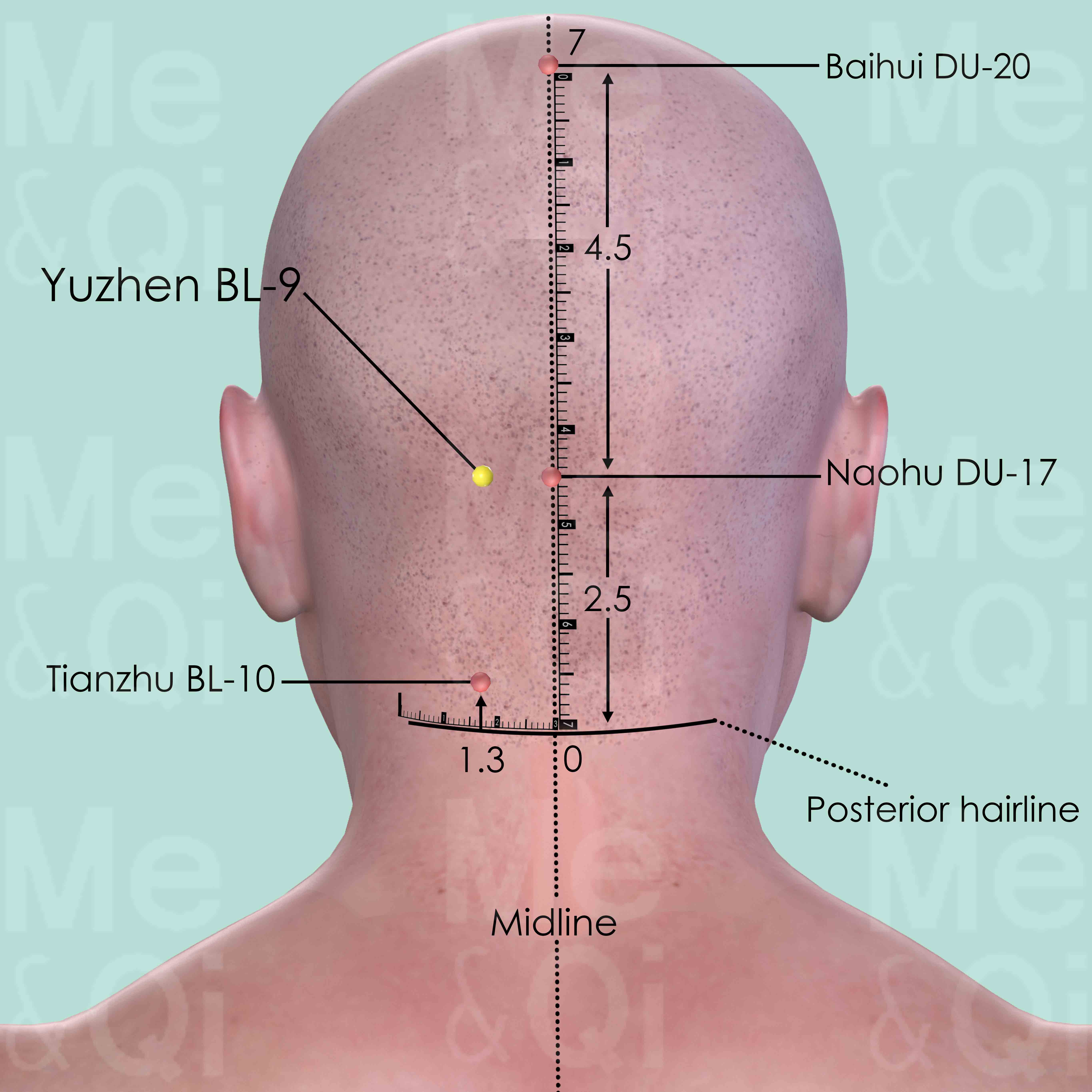
Yuzhen BL-9
First identify Naohu DU-17 which is on the superior border of the external occipital protuberance. Yuzhen BL-9 is 1.3 cun lateral to Naohu DU-17.
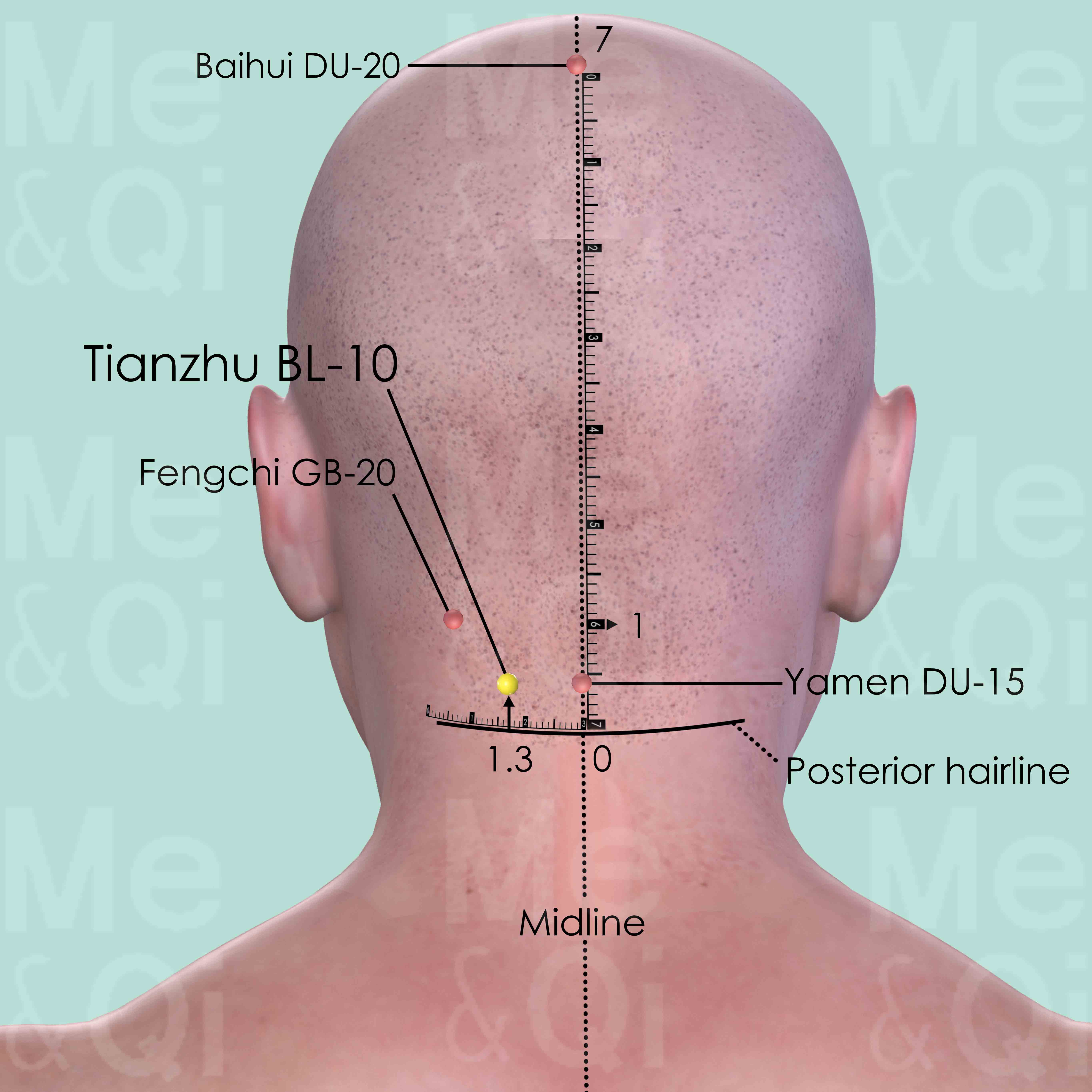
Tianzhu BL-10
1.3 cun lateral to Yamen DU-15 on the posterior midline, 0.5 cun above the posterior hairline, on the lateral side of trapezius muscle.
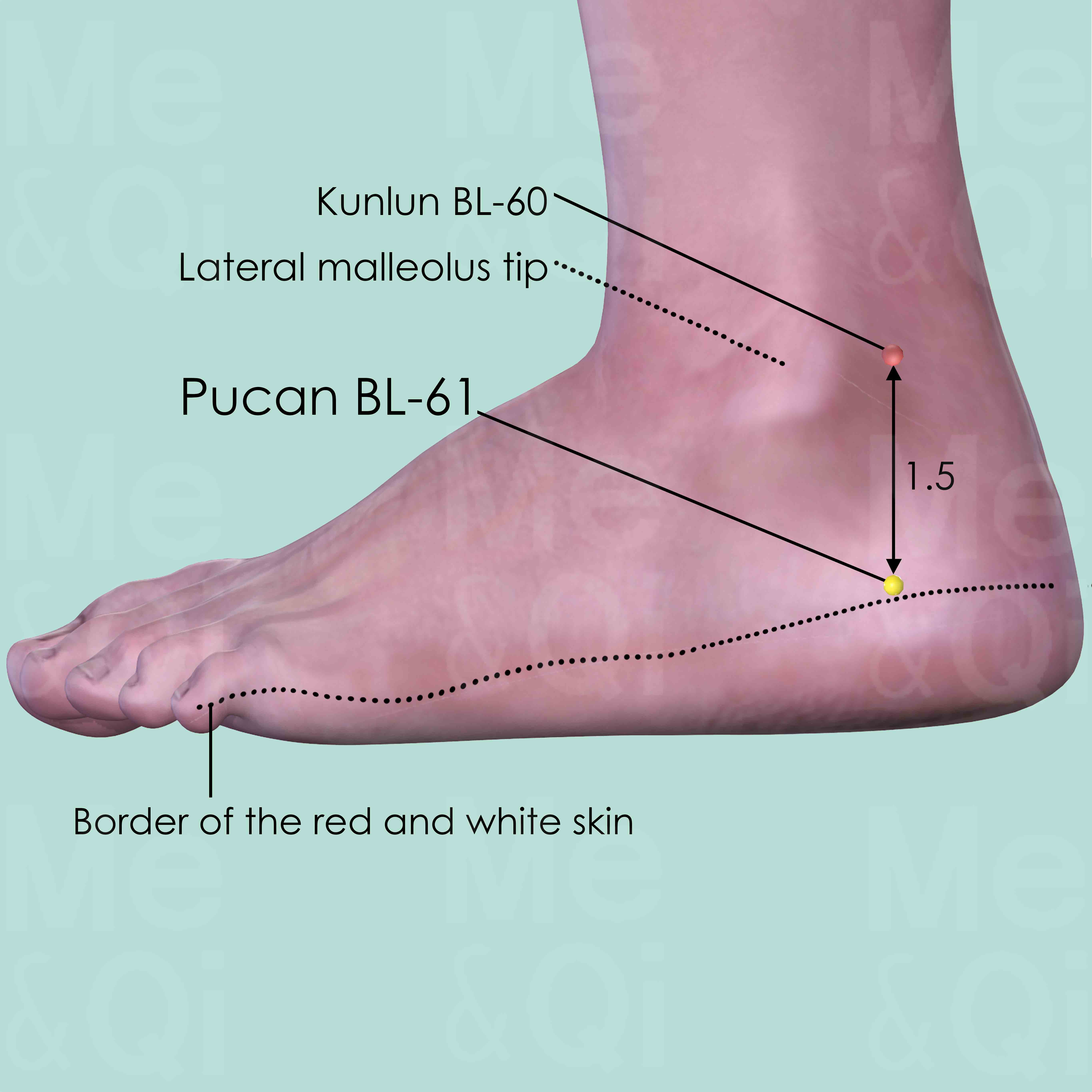
Pucan BL-61
Posterior and inferior to the external malleolus, directly below Kunlun BL-60, in the depression of the calcaneum at the junction of the red and white skin.
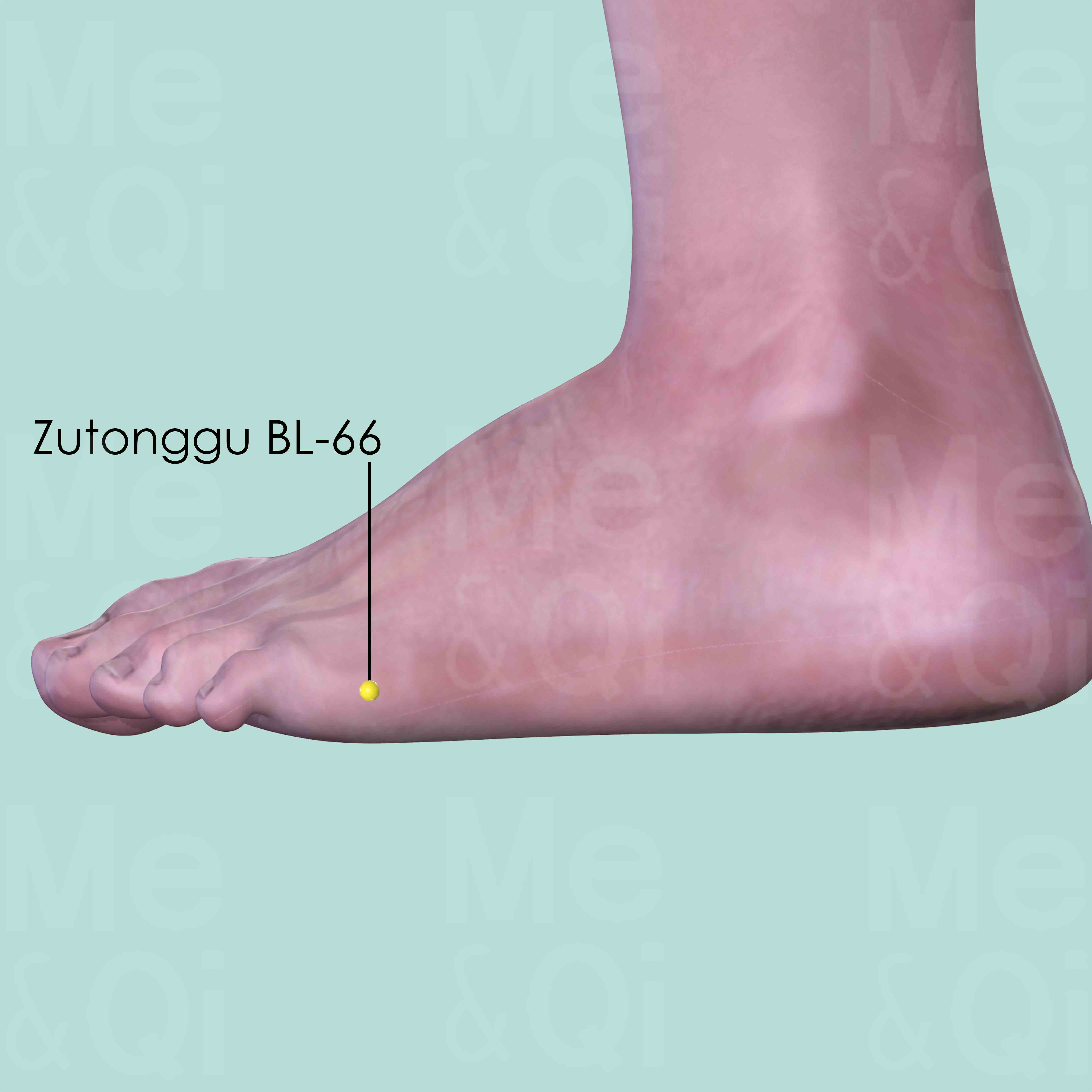
Zutonggu BL-66
In the depression distal and inferior to the 5th metatarsophalangeal joint, at the lateral border of the foot.
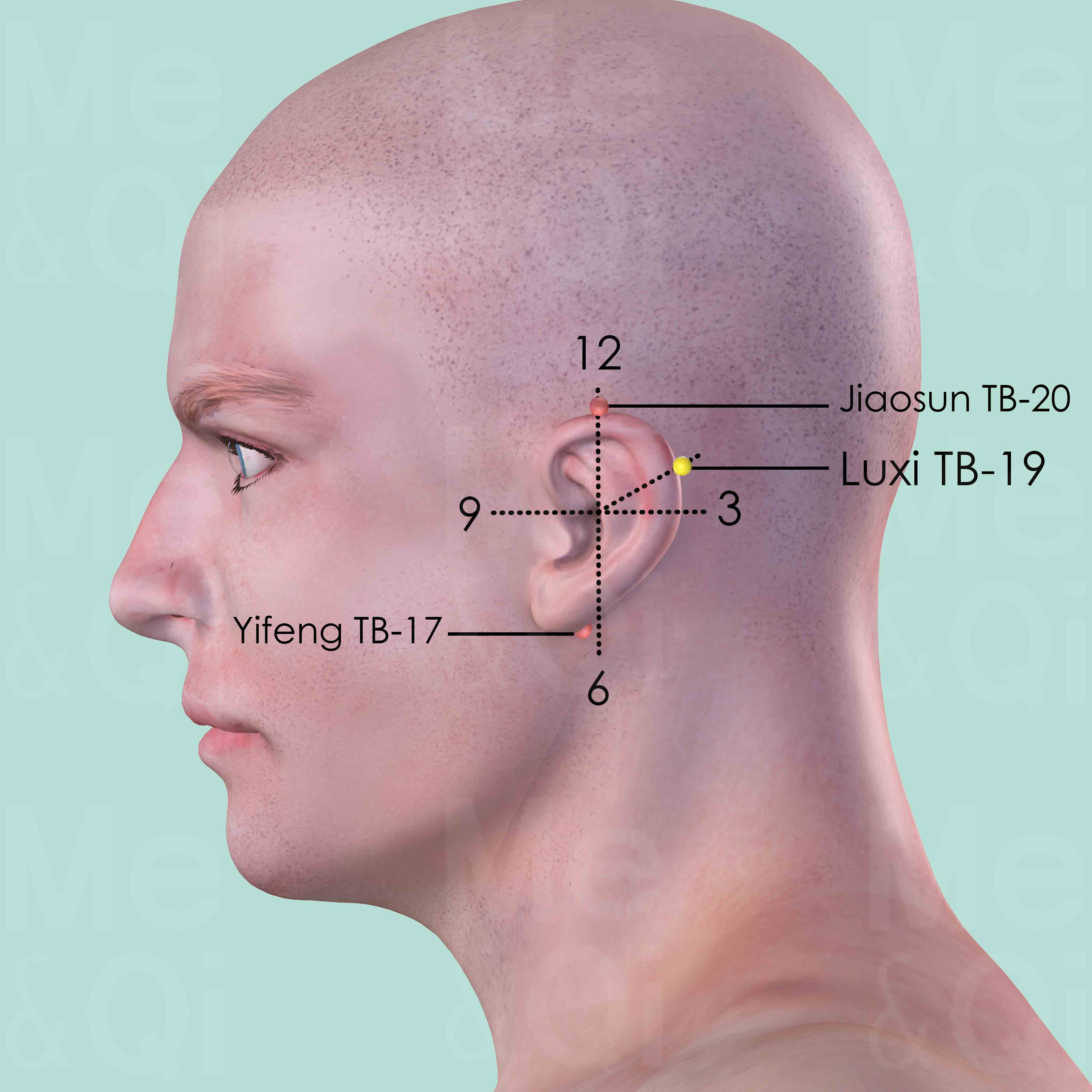
Luxi TB-19
Posterior to the ear, at the junction of the upper and middle third of the curve formed by Yifeng ST-17 and Jiaosun ST-20 behind the helix.
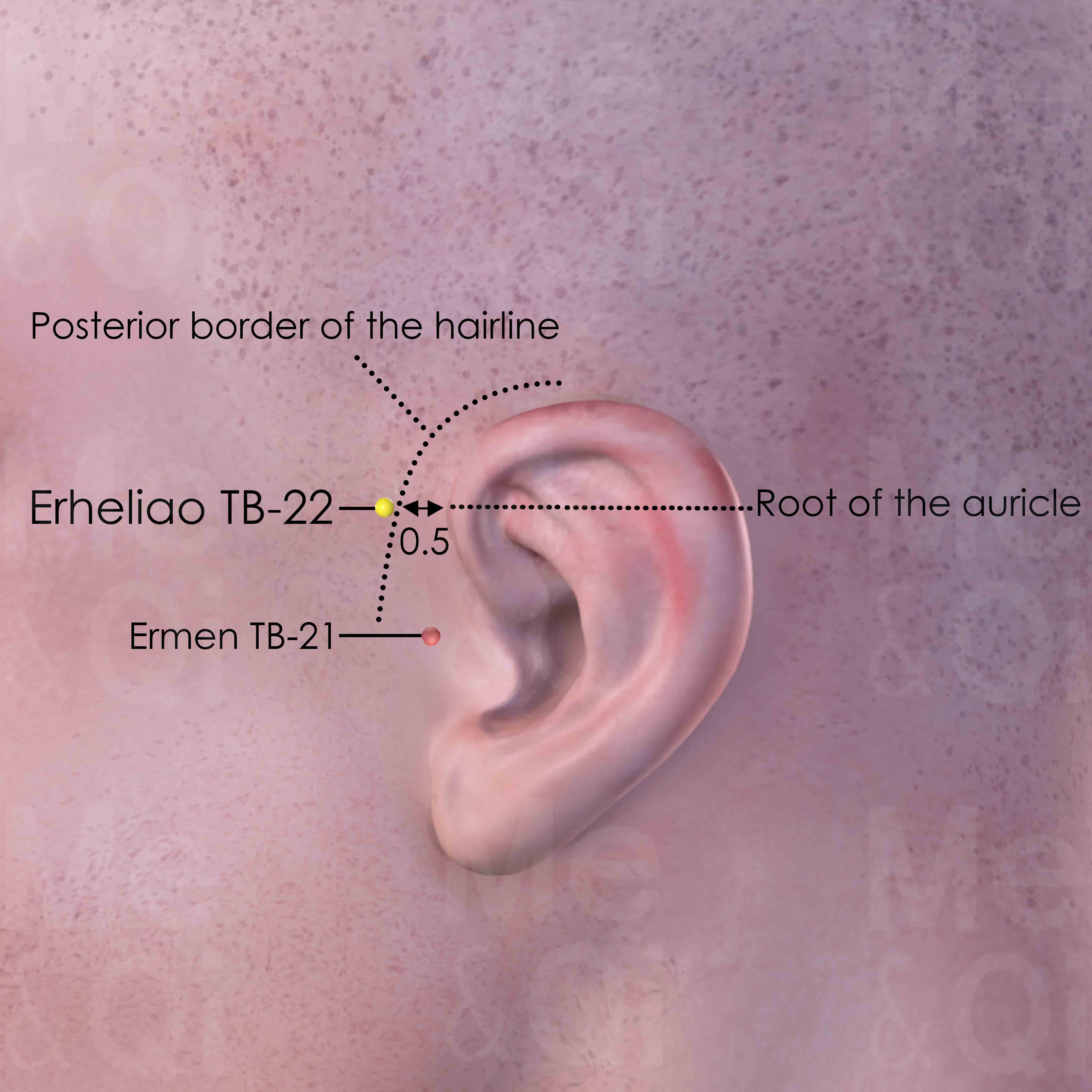
Erheliao TB-22
Anterior and superior to Ermen TB-21, level with the root of the auricle, on the posterior border of the hairline of the temple where the superficial temporal artery passes.
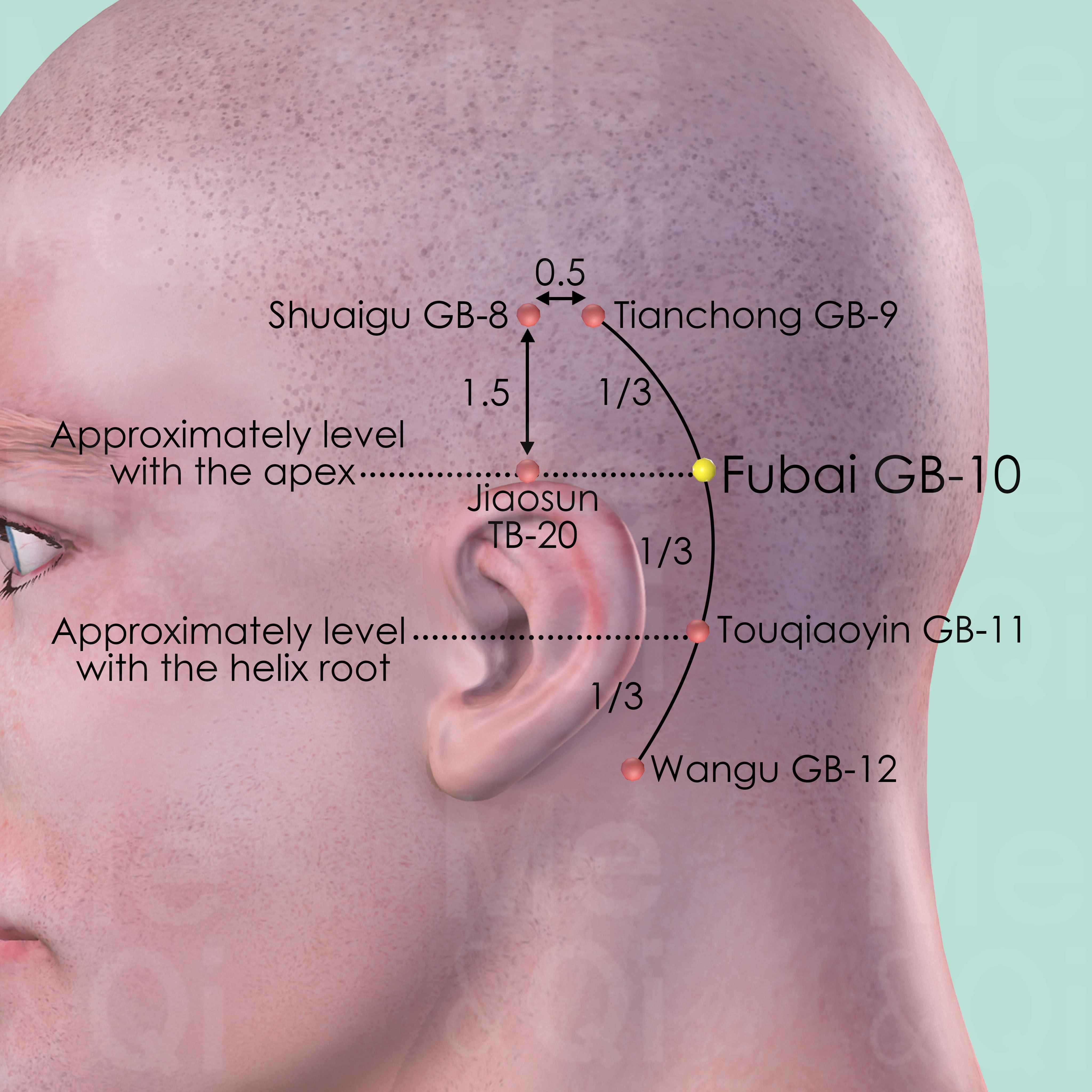
Fubai GB-10
Posterior and superior to the mastoid process, at the junction of the upper third and the two lower thirds of the curved line connecting Tianchong GB-9 and Wangu GB-12.
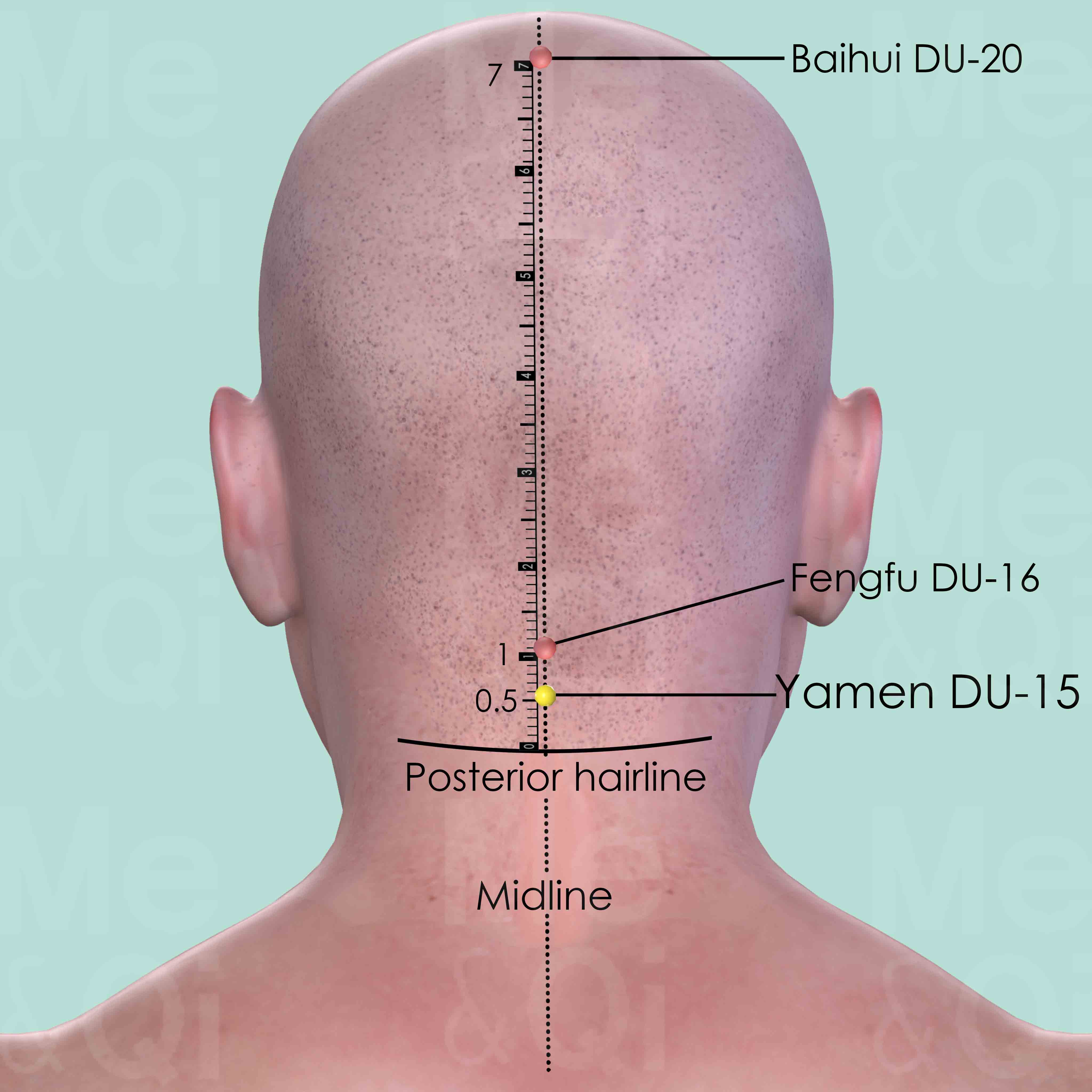
Yamen DU-15
On the back of the neck, 0.5 cun directly above the midpoint of the posterior hairline, below the spinous process of 1st cervical vertebra (C1).
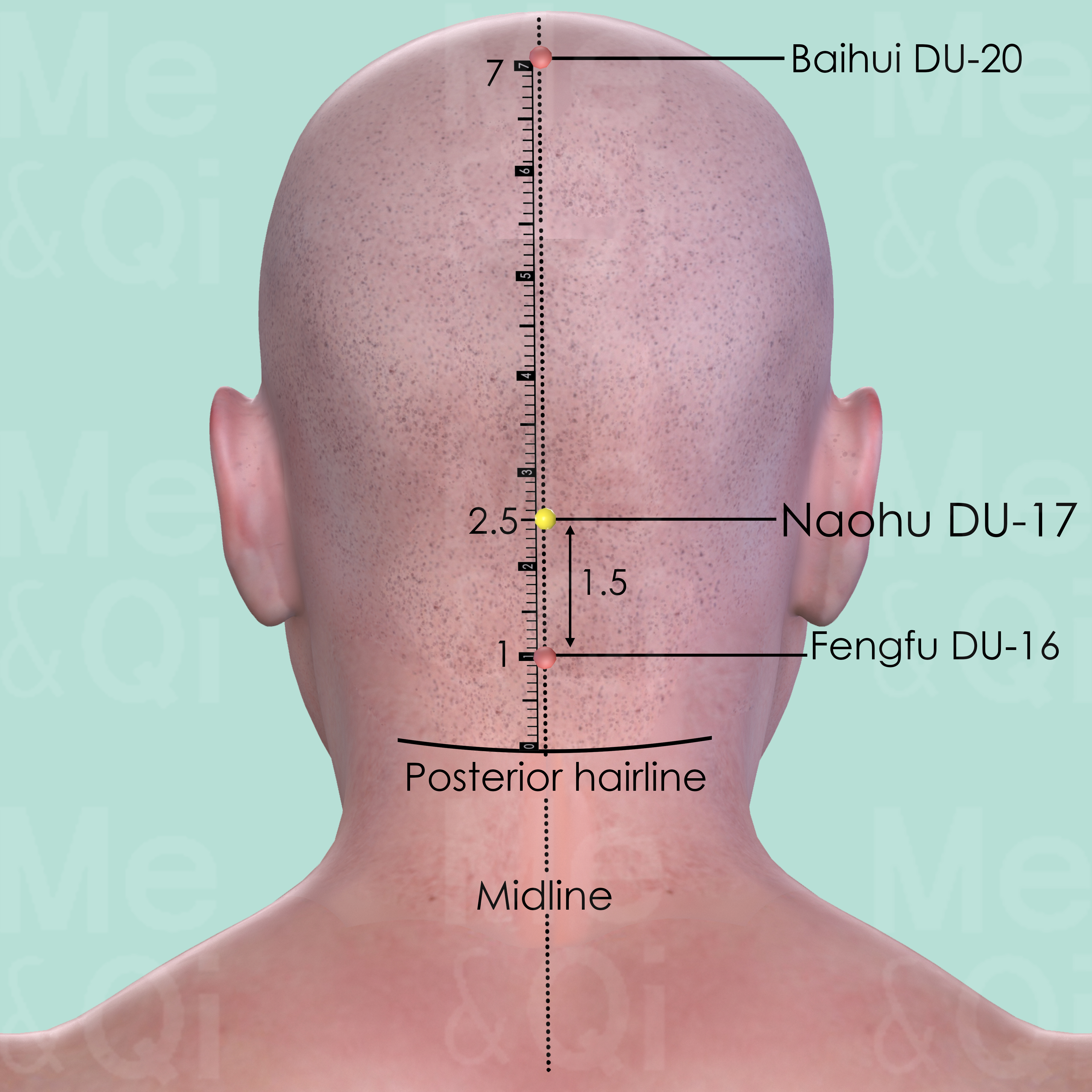
Naohu DU-17
1.5 cun above Fengfu DU-16 or 2.5 cun above the posterior hairline, in a depression superior to the external occipital protuberance.
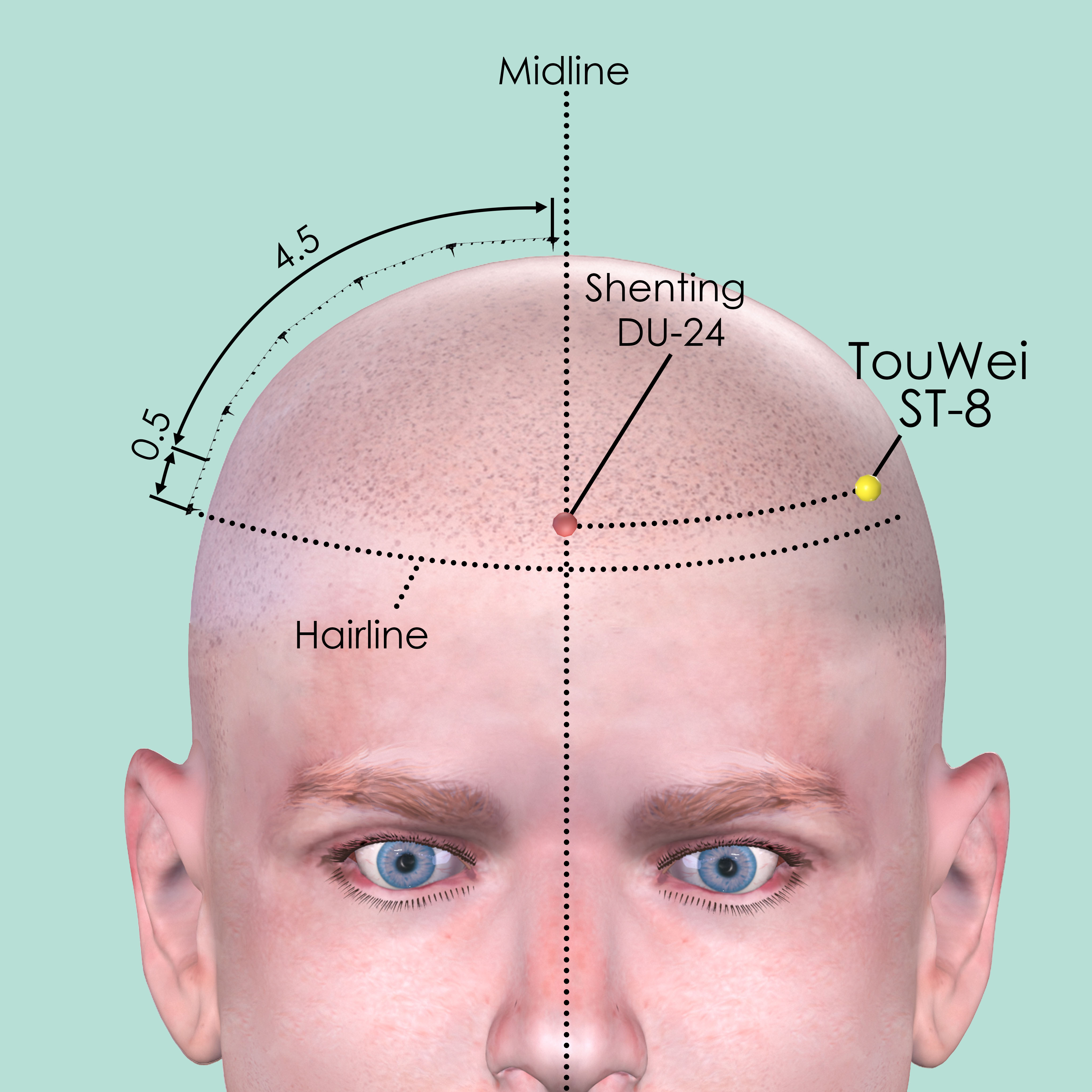
Touwei ST-8
At the temporal corner of the forehead, on the border of the temporalis muscle. 0.5 cun within the anterior hairline at the corner of the forehead and 4.5 cun lateral to the anterior midline.
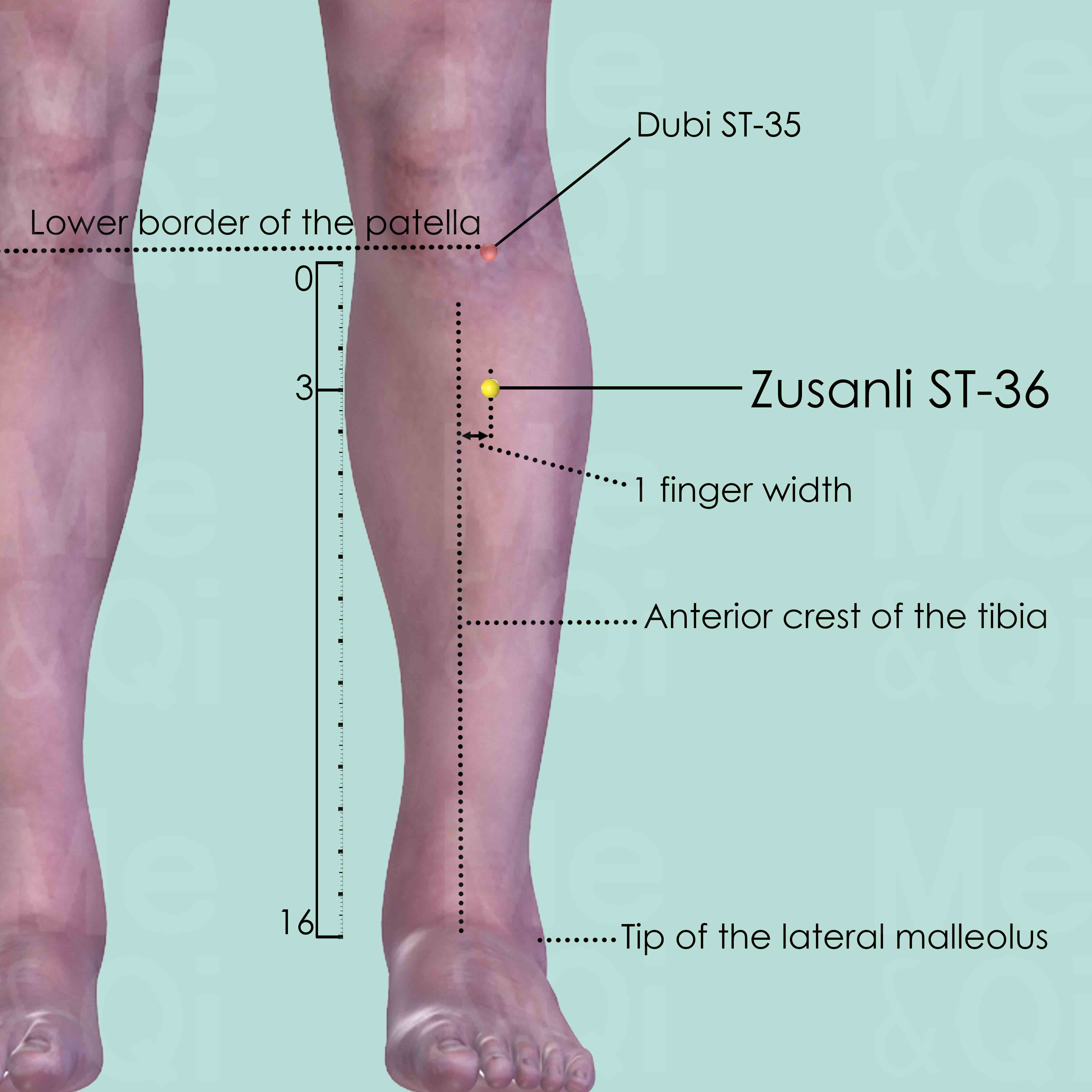
Zusanli ST-36
3 cun below Dubi ST-35, one finger breadth lateral to the anterior crest of the tibia, on the tibialis anterior muscle.
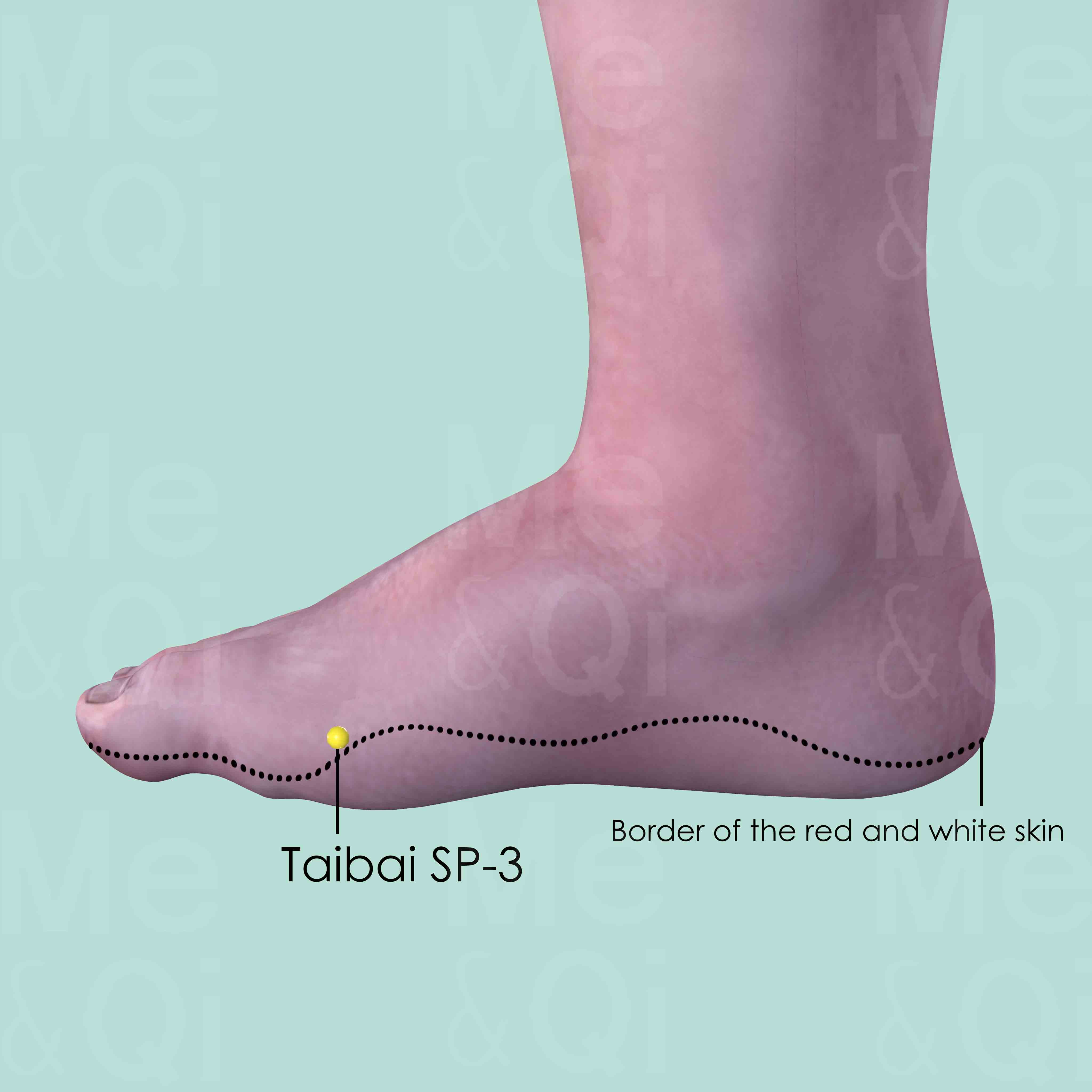
Taibai SP-3
Proximal and inferior to the head of the 1st metatarsal bone, at the border of the red and white skin.

